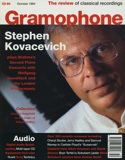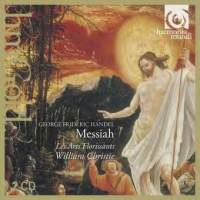Texte paru dans: / Appeared in:
|
|
|
Reviewer: Nicholas
Anderson This is the second complete recording of Handel's Messiah to be issued by Harmonia Mundi. The earlier one, under Nicholas McGegan's direction was one of the most disappointing accounts that I have heard, though my reaction to it was by no means universally shared. William Christie, less preoccupied with minutiae which prevented McGegan from seeing the wood from the trees, reaches the heart of Handel's masterpiece in oratorio form with far greater fluency, with a surer dramatic pacing and an intuitive feeling for the nobility of the piece . As Donald Burrows remarks in his accompanying essay, one of two included in the booklet, Christie's performance generally follows a pattern of the work close to that which Handel seems to have adhered to from the mid 1740s, thus incorporating the chorus, "Their sound is gone out into all lands " (Part 2) . Additionally, Christie uses the later versions of the arias "But who may abide the day of his coming" (Part I), and "Thou art gone up on high" (Part 2), for alto and soprano, respectively.
Christie brings lively characterization to Messiah allowing the text, to which he clearly attaches importance, to determine the prevailing effect of each number. In this he is fully supported by a first-rate team of soloists, a responsive if not always impeccably drilled choir and a body of instrumentalists which sounds particularly strong at the moment. The vocal timbres of the two sopranos , Barbara Schlick and Sandrine Piau are a constant delight - Piau's "Rejoice greatly" and Schlick's "He shall feed his flock" are but two instances of outstanding singing - and, in the same register, the boy treble, Tommy Williams is as reliable in his intonation as he is clear in declamation. Mark Padmore is impressive, too, for sensitive phrasing and a lyrical approach to the music - his recitative "Thy rebuke hath broken his heart" and aria " Behold and see" are serenely appealing while Nathan Berg is resonant, authoritative and thankfully lacking that vacuous blusteriness which is sometimes apt to diminish the strength of arias such as "Why do the nations so furiously rage together?". But it is, perhaps, Andreas Scholl who touches the heart most profoundly with his deeply felt singing of "He was despised".
The choir of
Les Arts Florissants, as I say, is splendidly alert to the many nuances which
Christie discovers in Handel's music. Just occasionally I felt that Christie
overdoes the puckish staccato declamation, as for instance in the chorus "Lift
up your heads". But this is a small quibble in among so much else that is
first-rate. And last, but not least, there is the orchestra, crisp, incisive,
warm in timbre and producing one of the most homogeneous sounds I've yet heard
from its strings. In short, this is a triumph. Christie's concept of the
oratorio embraces the entirety, enabling him to present a continuous drama in a
manner which holds our attention from start to finish. Readers will, of course,
have personal feelings about a work which has for so long been at the centre of
our musical life, and a variety of performing styles will always be ferociously
defended. For me, the great strength of Christie's version lies in the fact that
it comes over foremost as a performance as opposed to a recording; and that a
happy conjunction of soloists and ripienos, at one in their feeling for
restrained ornament, for melody and for texture has resulted in a reading which
is acutely sensible to the great humanity of the piece. |
|
|
|
|
|
Cliquez l'un ou l'autre
bouton pour découvrir bien d'autres critiques de CD |
|




